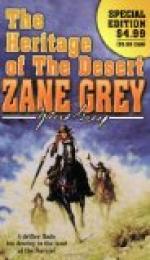There was a long silence. Mescal smoothed out Bolly’s mane, and Hare gazed up at the walls with eyes that did not see them.
Presently he spoke. “I’m afraid for you. Snap watched us to-day at dinner.”
“He’s jealous.”
“Suppose he sees this scarf?”
Mescal laughed defiantly. It was bewildering for Hare to hear her.
“He’ll—Mescal, I may yet come to this.” Hare’s laugh echoed Mescal’s as he pointed to the enclosure under the wall, where the graves showed bare and rough.
Her warm color fled, but it flooded back, rich, mantling brow and cheek and neck.
“Snap Naab will never kill you,” she said impulsively.
“Mescal.”
She swiftly turned her face away as his hand closed on hers.
“Mescal, do you love me?”
The trembling of her fingers and the heaving of her bosom lent his hope conviction. “Mescal,” he went on, “these past months have been years, years of toiling, thinking, changing, but always loving. I’m not the man you knew. I’m wild— I’m starved for a sight of you. I love you! Mescal, my desert flower!”
She raised her free hand to his shoulder and swayed toward him. He held her a moment, clasped tight, and then released her.
“I’m quite mad!” he exclaimed, in a passion of self-reproach. “What a risk I’m putting on you! But I couldn’t help it. Look at me— Just once—please— Mescal, just one look. . . . Now go.”
The drama of the succeeding days was of absorbing interest. Hare had liberty; there was little work for him to do save to care for Silvermane. He tried to hunt foxes in the caves and clefts; he rode up and down the broad space under the walls; he sought the open desert only to be driven in by the bitter, biting winds. Then he would return to the big living-room of the Naabs and sit before the burning logs. This spacious room was warm, light, pleasant, and was used by every one in leisure hours. Mescal spent most of her time there. She was engaged upon a new frock of buckskin, and over this she bent with her needle and beads. When there was a chance Hare talked with her, speaking one language with his tongue, a far different one with his eyes. When she was not present he looked into the glowing red fire and dreamed of her.
In the evenings when Snap came in to his wooing and drew Mescal into a corner, Hare watched with covert glance and smouldering jealousy. Somehow he had come to see all things and all people in the desert glass, and his symbol for Snap Naab was the desert-hawk. Snap’s eyes were as wild and piercing as those of a hawk; his nose and mouth were as the beak of a hawk; his hands resembled the claws of a hawk; and the spurs he wore, always bloody, were still more significant of his ruthless nature. Then Snap’s courting of the girl, the cool assurance, the unhastening ease, were like the slow rise, the sail, and the poise of a desert-hawk before the downward lightning-swift swoop on his quarry.




